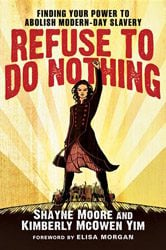 Jewish mysticism asserts that when you save one soul, you save the world. At the heart of this viewpoint is the belief that the world will not be healed until everyone is healed. Read from this perspective, Jesus’ parable of the lost sheep is as much about the ninety-nine sheep apparently safe in the pen as the one lost in darkness – without that one sheep, the herd cannot be whole. In fact, it remains lost!
Jewish mysticism asserts that when you save one soul, you save the world. At the heart of this viewpoint is the belief that the world will not be healed until everyone is healed. Read from this perspective, Jesus’ parable of the lost sheep is as much about the ninety-nine sheep apparently safe in the pen as the one lost in darkness – without that one sheep, the herd cannot be whole. In fact, it remains lost!
That’s the point of Shayne Moore and Kimberly McCowen Yim’s Refuse to Do Nothing. Like many of the biblical heroes and heroines, they are completely unprepared to respond to the daunting task in front of them: putting an end to modern day slavery. They are everyday people and not social activists. They know their neighborhoods but not the globe. But, they perceive God calling them in the pain of enslaved children and adults.
As I read the bible, I often wonder why certain women, children, and men were called to leadership: Mary the mother of Jesus, Mary of Magdala, the boy with the five loaves and two fish, the tax collector Levi, Jeremiah. I have come to believe that many others were called, but they did the two most important things: they said “yes” and then followed through. They realized like Queen Esther that their call to take a stand or to do something surprising to change the community was right now, right here, “for just such a time as this.” It could not be deferred to another day or a better time. It is now!
It has been said that the difference between ignorance and apathy is “I don’t know and I don’t care.” Moore and Yim did the remarkable: they heard about slavery and sex trafficking and chose to respond. They recognized that what appeared to be their powerlessness was in fact the seed bed of transformation. Like Jesus’ parable of the mustard seed, they recognized that small beginnings can lead to great things and the great thing they sought to nurture over time was a safe world (primarily) for women and children, but also for men who grieve the loss of siblings, spouses, and children to modern day slavery, indentured servitude, and sex working.
I must say that my heart was broken as I read their book: I have two lovely grandchildren, who are just getting starting at life, innocent, spontaneous, loved, happy, and secure. But, sometimes I worry about their well-being. I would do anything to protect them – and by that, as a dispositional pacifist, I mean, anything! I realize that they cannot be protected from the hard knocks of life, including the reality that someday (with the hope that they will be healthy) they will be witness to my aging and dying. I am not alone in caring for my grandchildren, just as I am not alone in loving my only son. I am in the company of many parents who must mourn the loss of children to modern day slavery.
Yim and Moore were also heartbroken as they pondered the pain of small children and their parents, but they did not narcotize themselves or say that’s just the way of the world. They acted. They believed that one person could make a difference and that five loaves and two fish could feed a multitude. It is easy, and I succumb to this, to feel hopeless about spiritual transformation, even among people of faith: I am appalled in the USA that many Christians love their guns more than small children (and refuse to support even rational gun laws); that the stiffest opposition to global climate change and women’s rights have come from Christians; and that hatred of immigrants is often preached in Christian pulpits. Our self-interest, hard-heartedness, and complacency are great. But, Yim and Moore tell us that the lure of the gospel message – as you have done unto the least of these – can be greater.
The words from Matthew 25 are not just pretty poetics; they are theology and spirituality. They imply that we are shaping God by the way we treat others; that God is a different God with different experiences as a result what we do in the world. God is truly changed by the world: God heard the cries of the oppressed Hebrews in Egypt and responded. Jesus wept over the loss of a friend (Lazarus) and the ignorance of Jerusalem. God changed God’s mind in response to Nineveh’s repentance and God reminded Jonah that both animals and humans matter – most especially to God.
Mother Teresa says her task as “doing something beautiful for God.” And, that’s the heart of worship and spirituality? Orthodoxy really doesn’t matter much unless it motivates us to give God a more beautiful world. Worship is lifeless if it deadens us to the cries of the poor. Remember, what God requires – our love of the creation and creatures – and this means, to do justice, love mercy, and walk humbly in companionship with God? (Micah 6:8)
I was raised a Baptist and Yim and Moore’s book is really what we Baptists described as an “altar call,” a “come to Jesus” moment that demands transformation. I am asking you and asking myself as well: “What acts of justice is God calling you to? What saving practices is God luring you toward? How will you say ‘yes’ amid the busyness of your life? Where will do something beautiful for God with your small token, your five loaves and two fish?” You can’t do everything, but you can respond to God’s call to save the world one soul at a time.












